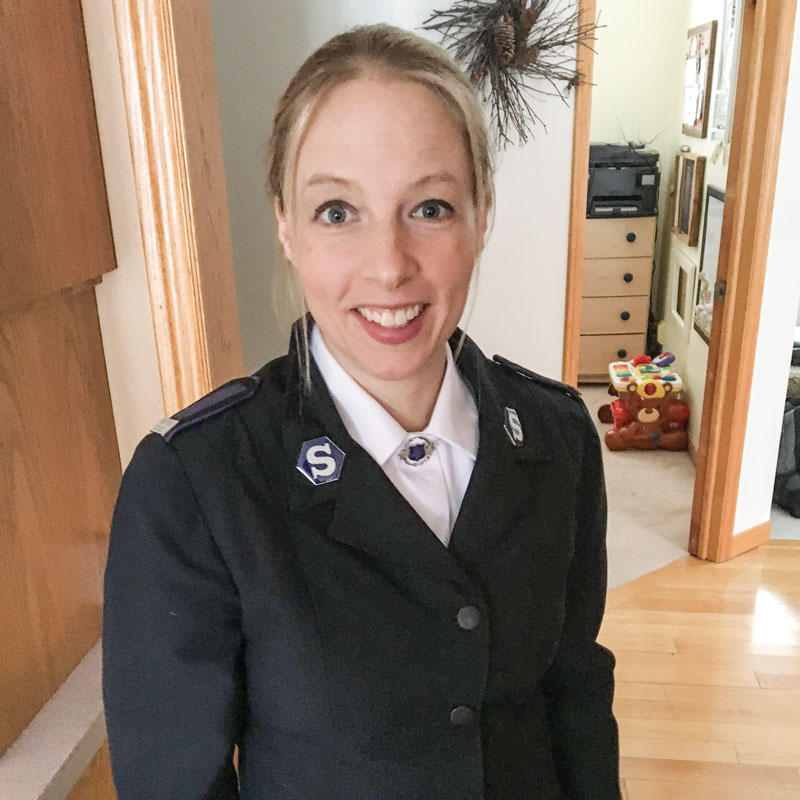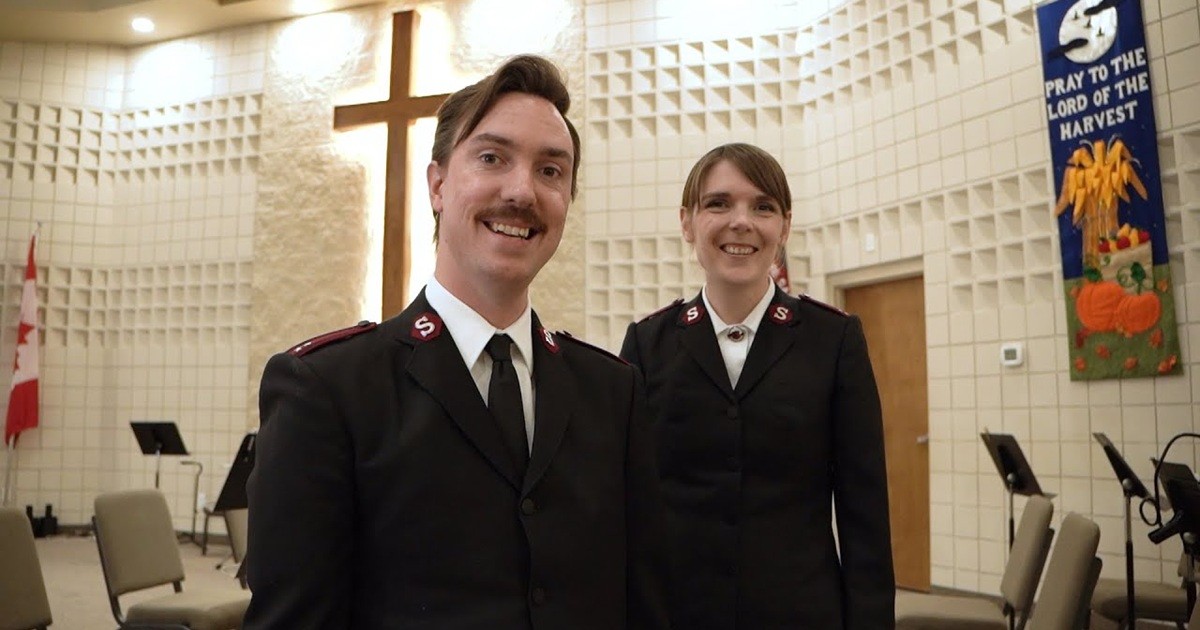"I had no intention of becoming a soldier,” recalls Charlene Feakins. “After all, it was a 40-minute drive to the Salvation Army church every Sunday, and I had lots of local options. Plus, I didn’t want to tie myself down to any specific church.”
It would take something pivotal for her to change her way of thinking. And that happened one evening in December 2017.
Unconditional Love
Before Feakins became a stay-at-home mom, she was an occupational therapist working in the field of mental health.
“I’d observed the impact The Salvation Army made in the community,” she says. “Salvationists loved and served people unconditionally, not because they were trying to convert them to their faith.
“After my divorce and remarriage, I wanted to be a part of a church where it didn’t matter what your socio-economic status was. For The Salvation Army, Jesus calls them to love people for who they are because that is what he did. I wanted to be a part of that.”
Feakins started attending the Army’s Kingston Citadel in Ontario with her husband, Martin, and enjoyed worshipping there, so much so that when her corps officer, Major David McNeilly, asked her if she would be interested in taking soldiership classes, she accepted.
“I was willing to attend but I was on the fence about soldiership,” explains Feakins. “I wanted to be flexible and go where I felt my family’s spiritual needs would be fulfilled. Plus, I didn’t see the big deal in wearing a uniform.”
That was how things stood a couple of weeks before her soldiership classes came to an end.
And that was when she fell asleep one night and awoke the next morning a changed person.
The Dream
I was in a three-storey department store. On each floor was a female mannequin on display.
The first-floor mannequin was not set up yet. The mannequin on the second floor had a magnetic uniform whose parts could be easily removed—shirt, skirt, lapels, pins. I remember thinking I could place this uniform on the third-floor mannequin, where it could remain, permanently pressed and clean. But I was frustrated and unsure what to do.
My boss was with me. He instructed me not to put the uniform on the mannequin but to wear it into the community. It looked like a wedding dress, long and the purest white, but it was not very practical or comfortable. I looked around me to see my coworkers wearing comfortable clothes. I stood out in my long bridal dress. I took the elevator to the main floor and a colleague drove up in a van. I got into the back, trying to manoeuvre my dress into the vehicle. I didn’t understand why I needed to be different, why I was called to stand out.
Dream Interpretation
Feakins woke up with vivid memories of her dream. “In fact, it brought me to tears,” she says.
“I’d been seeking God’s will in regard to becoming a uniformed soldier,” she reflects. “In this dream, my boss represented Jesus. He wasn’t asking me to get a uniform to simply attain a high level of membership in The Salvation Army—the third floor—or to have people just look at me and admire my good works. He wasn’t calling me to wear the uniform whenever it was convenient—the magnetic uniform. He was asking me to wear it into the community, to be the hands and feet of Christ. It was about rededicating my life as a bride of Christ—which is why I was wearing a wedding dress. Jesus was asking me to be different, to be pure, to stand out and to love deeply and wholly as I serve him.”
Symbol of Hope
That dream was transformational for Feakins.
“I felt the dream was God challenging me to make a deeper commitment to my faith,” she says. “And for me, taking that important step in my walk of faith was my way of saying I was going to make it work, despite the hassles of the commute or how I felt about the uniform.”
Feakins became a soldier on December 18, in time for the holidays. Though she had been on the kettles before, this was her first Christmas in uniform, and the difference was pronounced.
“I wore a skirt, and it was cold!” she laughs. “But the number of conversations I struck up with people being in my uniform, telling them what the Army does and stands for, was profound.
“The uniform is not some status symbol for those who are part of the church,” she concludes. “It stands for something. It’s a symbol of hope for people who need it. And I am proud of that.”
It would take something pivotal for her to change her way of thinking. And that happened one evening in December 2017.
Unconditional Love
Before Feakins became a stay-at-home mom, she was an occupational therapist working in the field of mental health.
“I’d observed the impact The Salvation Army made in the community,” she says. “Salvationists loved and served people unconditionally, not because they were trying to convert them to their faith.
“After my divorce and remarriage, I wanted to be a part of a church where it didn’t matter what your socio-economic status was. For The Salvation Army, Jesus calls them to love people for who they are because that is what he did. I wanted to be a part of that.”
Feakins started attending the Army’s Kingston Citadel in Ontario with her husband, Martin, and enjoyed worshipping there, so much so that when her corps officer, Major David McNeilly, asked her if she would be interested in taking soldiership classes, she accepted.
“I was willing to attend but I was on the fence about soldiership,” explains Feakins. “I wanted to be flexible and go where I felt my family’s spiritual needs would be fulfilled. Plus, I didn’t see the big deal in wearing a uniform.”
That was how things stood a couple of weeks before her soldiership classes came to an end.
And that was when she fell asleep one night and awoke the next morning a changed person.
The Dream
I was in a three-storey department store. On each floor was a female mannequin on display.
The first-floor mannequin was not set up yet. The mannequin on the second floor had a magnetic uniform whose parts could be easily removed—shirt, skirt, lapels, pins. I remember thinking I could place this uniform on the third-floor mannequin, where it could remain, permanently pressed and clean. But I was frustrated and unsure what to do.
My boss was with me. He instructed me not to put the uniform on the mannequin but to wear it into the community. It looked like a wedding dress, long and the purest white, but it was not very practical or comfortable. I looked around me to see my coworkers wearing comfortable clothes. I stood out in my long bridal dress. I took the elevator to the main floor and a colleague drove up in a van. I got into the back, trying to manoeuvre my dress into the vehicle. I didn’t understand why I needed to be different, why I was called to stand out.
Dream Interpretation
Feakins woke up with vivid memories of her dream. “In fact, it brought me to tears,” she says.
“I’d been seeking God’s will in regard to becoming a uniformed soldier,” she reflects. “In this dream, my boss represented Jesus. He wasn’t asking me to get a uniform to simply attain a high level of membership in The Salvation Army—the third floor—or to have people just look at me and admire my good works. He wasn’t calling me to wear the uniform whenever it was convenient—the magnetic uniform. He was asking me to wear it into the community, to be the hands and feet of Christ. It was about rededicating my life as a bride of Christ—which is why I was wearing a wedding dress. Jesus was asking me to be different, to be pure, to stand out and to love deeply and wholly as I serve him.”
Symbol of Hope
That dream was transformational for Feakins.
“I felt the dream was God challenging me to make a deeper commitment to my faith,” she says. “And for me, taking that important step in my walk of faith was my way of saying I was going to make it work, despite the hassles of the commute or how I felt about the uniform.”
Feakins became a soldier on December 18, in time for the holidays. Though she had been on the kettles before, this was her first Christmas in uniform, and the difference was pronounced.
“I wore a skirt, and it was cold!” she laughs. “But the number of conversations I struck up with people being in my uniform, telling them what the Army does and stands for, was profound.
“The uniform is not some status symbol for those who are part of the church,” she concludes. “It stands for something. It’s a symbol of hope for people who need it. And I am proud of that.”










Comment
On Saturday, April 28, 2018, Aubrey Garrett said:
Leave a Comment